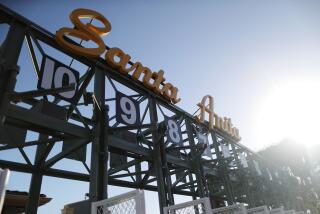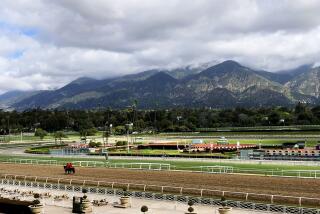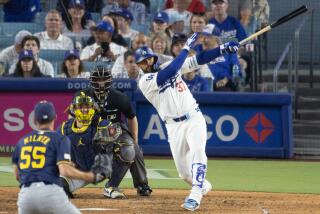West Now Beats the Rest : Kentucky Derby: California horses used to be easy targets for jokes in the Run for the Roses, but they have won six of the last eight.
LOUISVILLE, Ky. — On Broadway, Robert Morse is playing the late Truman Capote in the one-man show called “Tru.”
At each performance, Morse/Capote says: “Every year you live in California, you lose two points on your I.Q.”
Other than mothers-in-law, is there a better source for jokes than the California intellect? Mike Nichols used to say that the reason he moved back to New York was: “When you live in California, you have the feeling that something’s going on back there, and you’re never going to find out about it.”
California horses used to be jokes in the Kentucky Derby, too. The period from 1970 through 1981 was an especially bleak time for California horsemen making the late-April trek to Churchill Downs. Affirmed won the 1978 Kentucky Derby and swept the Triple Crown after winning the Santa Anita and Hollywood Derbys, but he was considered the product of a bicoastal environment, since he had trained as a 2-year-old in New York.
Before and after Affirmed in the 1970s, California horses were sure things in the Derby--sure things to cause bettors to tear up their tickets.
The Derby drought started in 1970 when Terlago, the Santa Anita Derby winner, ran 11th here. After that, the West Coast horses flowed back here like good California wine, only to be corky once they were tested. In 1971, Jim French and Unconscious, 1-2 in the Santa Anita Derby, appeared to give California a stranglehold on the Kentucky Derby. Unconscious even went off the favorite, because he came into Louisville off a strong win in the California Derby, but he was injured while running fifth at Churchill Downs. Jim French finished second to Canonero II.
For the rest of the 1970s, with the exception of Affirmed, Louisville was Tap City for California invaders. In 1974, they appeared to have strength in numbers, because seven of the 23 starters were from the West Coast, but no one could do any better than Agitate, who finished third.
In 1975, there were only two California horses in the race, and they managed to get in one another’s way in the stretch. Diabolo, who held the lead, veered to the outside, bumping the closing Avatar and knocking him off stride. By the time Avatar regained his action, Foolish Pleasure had won the race, and the two California horses finished second and third. Avatar won the Belmont Stakes five weeks later.
As disappointing as the 1970-81 period may have been for California racing fans, the 1980 Derby was a harbinger of the dramatic turnaround that was to take place in the coming decade. Genuine Risk, the filly from New York, won in 1980, but California horses--Rumbo, Jaklin Klugman and Super Moment--occupied the next three positions.
California horses had no impact on the Derby in 1981, but when Gato Del Sol, at 21-1, shocked the Churchill Downs crowd in 1982, that was the start of a successful run that the West Coast has never experienced. Gato Del Sol, Sunny’s Halo--not California-raced, but Hollywood Park-trained over the winter--Ferdinand, Alysheba, Winning Colors and Sunday Silence have given the West Coast six Derby victories in the last eight years. California horses are now feared here, rather than being joked about as pretentious frauds.
The 116th Kentucky Derby, which will be run Saturday, could give Californians another niche on their saddlebags. Of the 17 horses likely to run, nine have some sort of California connection, which is the state’s largest representation since 1974.
The group is led by Mister Frisky, unbeaten in all 16 races. Mister Frisky, according to Churchill Downs linemaker Mike Battaglia, will be the close second choice to Summer Squall when the morning line is announced at entry time Thursday.
Mister Frisky, who is from California by way of Florida and Puerto Rico, will be joined by trainer Wayne Lukas’ trio of Land Rush, Real Cash and Power Lunch; the Bobby Frankel-trained pair of Burnt Hills and Pendleton Ridge; Silver Ending, Pleasant Tap and Video Ranger.
Lukas, who has had 15 Derby starters, running at least one horse in the race every year since 1981, finally won here with Winning Colors, the filly, in 1988.
“The weather is a big factor why California horses do so good in Kentucky,” Lukas said. “By and large, you know that you’re going to get decent weather at Santa Anita, and going out to the track out there every day, you even get trapped into thinking that the weather must be that good back East, too.
“But then I start calling my assistants back there, and they tell me it’s cold one place and raining another place. If you’ve shipped a horse somewhere for an important prep race, and the track comes up muddy, then you either have to skip the race, or run a horse over a track that isn’t right for him.”
Laz Barrera, who trains Mister Frisky, has won the Derby both ways, with horses that came from the East and the West. In 1976, Barrera, based on advice from jockey Laffit Pincay, shipped Bold Forbes out of Santa Anita, where he was running well but not really handling the track’s hard surface. Bold Forbes won two races in New York, including the Wood Memorial, and gave Barrera his first Derby victory.
Two years later, Barrera did the opposite. Affirmed, voted the champion 2-year-old colt based on an Eastern campaign, wintered at Santa Anita and won four California races, including the Santa Anita and Hollywood Derbys, before beating Alydar here in the renewal of their extraordinary rivalry.
“California does good in the Kentucky Derby because it has better horses,” Barrera said the other day. “Look at the barns of Charlie Whittingham and Wayne Lukas. They have the best horses in the world in those barns. Ron McAnally (the trainer of Silver Ending), he has some of the best horses around, too.”
Barrera also feels that the time factor gives California horses an advantage in the Kentucky Derby. Whittingham, who won the Kentucky Derby with Ferdinand and Sunday Silence, brought them here off races in the Santa Anita Derby, which is run a month before the Kentucky Derby. Mister Frisky will try to win Saturday with the same schedule. There will be only one other horse in the field--Video Ranger, who ran second to Mister Frisky in the Santa Anita Derby--with as much rest.
Lee Rossi has never started a horse in the Kentucky Derby, but he is a trainer familiar with racing on the West Coast and back here, having left California for the Midwest in 1987.
“The purses and the weather make California racing the best in the country,” Rossi said. “The emergence of the Lukas operation has also been a big boost to California racing.
“The California horses that come to the Derby have been severely tested already. Any horse that finishes first, second or third in the Santa Anita Derby can be considered one of the best 3-year-olds in the country.”
When California horses foundered at Churchill Downs, one of the reasons given was that they couldn’t handle the deep, cuppy racing surface. Rossi, however, thinks that California horses enjoy it when they come to the Derby.
“They’re used to those firm surfaces back there,” he said. “Then when they’re introduced to these deeper tracks here, they think they’re in heaven. Their legs and feet feel better and they run better.”
Howie Tesher is a New York trainer who has Champagneforashley, the colt whose undefeated record was shattered by a third-place finish in the Wood last month. Champagneforashley is out of the Derby, but may run in the Preakness, the second Triple Crown race, at Pimlico on May 19.
“I think California’s been getting the better horses for several years now,” Tesher says. “Also, I think the demise of Florida racing has helped make California what it is.”
Swale, the Derby winner in 1984, spent the early part of his 3-year-old season in Florida, where the New York trainers traditionally prepare their Triple Crown candidates. Spend a Buck, who won the 1985 Derby, was a Florida-based horse who prepped for Churchill Downs in New York and New Jersey.
Since Swale, however, horses that prepped in Florida have not won the Kentucky Derby. This past year, with Gulfstream Park and Hialeah continuing their lengthy squabble over the choice racing dates, Florida racing hit bottom. Hialeah tried to run against Gulfstream Park and, facing millions of dollars in losses, was unable to complete its season. The Flamingo Stakes, the Hialeah fixture that has produced several Derby winners, wasn’t even run.
Unbridled, who won the Florida Derby at Gulfstream, is training for the Kentucky Derby. He was unable to beat Summer Squall in the Blue Grass on a muddy track at Keeneland, but he has done well since then and has the kind of late-running style that has won numerous Derbys.
But Silver Ending, Pleasant Tap, Video Ranger, Pendleton Ridge and Power Lunch also come from behind. And they are horses from California, which is the side of the tracks to be from when a trainer wants to win a Kentucky Derby these days.
CALIFORNIA-BASED DERBY WINNERS IN THE 1980s
Year Horse Margin Jockey 1982 Gato Del Sol 2 1/2 lengths Eddie Delahoussaye 1983 Sunny’s Halo 2 lengths Eddie Delahoussaye 1986 Ferdinand 2 1/4 lengths Bill Shoemaker 1987 Alysheba 3/4 length Chris McCarron 1988 Winning Colors neck Gary Stevens 1989 Sunday Silence 2 1/2 lengths Pat Valenzuela
Year Trainer Odds 1982 Eddie Gregson 21-1 1983 David Cross 5-2 1986 Charlie 17-1 Whittingham 1987 Jack Van Berg 8-1 1988 Wayne Lukas 3-1 1989 Charlie Whittingham 3-1
CALIFORNIA-BASED HORSES IN 1990 DERBY
Horse Jockey Trainer Finish, Last Race Mister Frisky Gary Stevens Laz Barrera 1st, Santa Anita Derby Silver Ending Chris McCarron Ron McAnally 1st, Arkansas Derby Land Rush Angel Cordero Wayne Lukas 2nd, Blue Grass Stakes Real Cash Alex Solis Wayne Lukas 2nd, Arkansas Derby Power Lunch Randy Romero Wayne Lukas 3rd, Arkansas Derby Burnt Hills Pat Valenzuela Bobby Frankel 2nd, Wood Memorial Pendleton Ridge Laffit Pincay Bobby Frankel 4th, Wood Memorial Pleasant Tap Kent Desormeaux Chris Speckert 2nd, Lexington Stakes Video Ranger Ron Hansen Ian Jory 2nd, Santa Anita Derby
More to Read
Go beyond the scoreboard
Get the latest on L.A.'s teams in the daily Sports Report newsletter.
You may occasionally receive promotional content from the Los Angeles Times.










